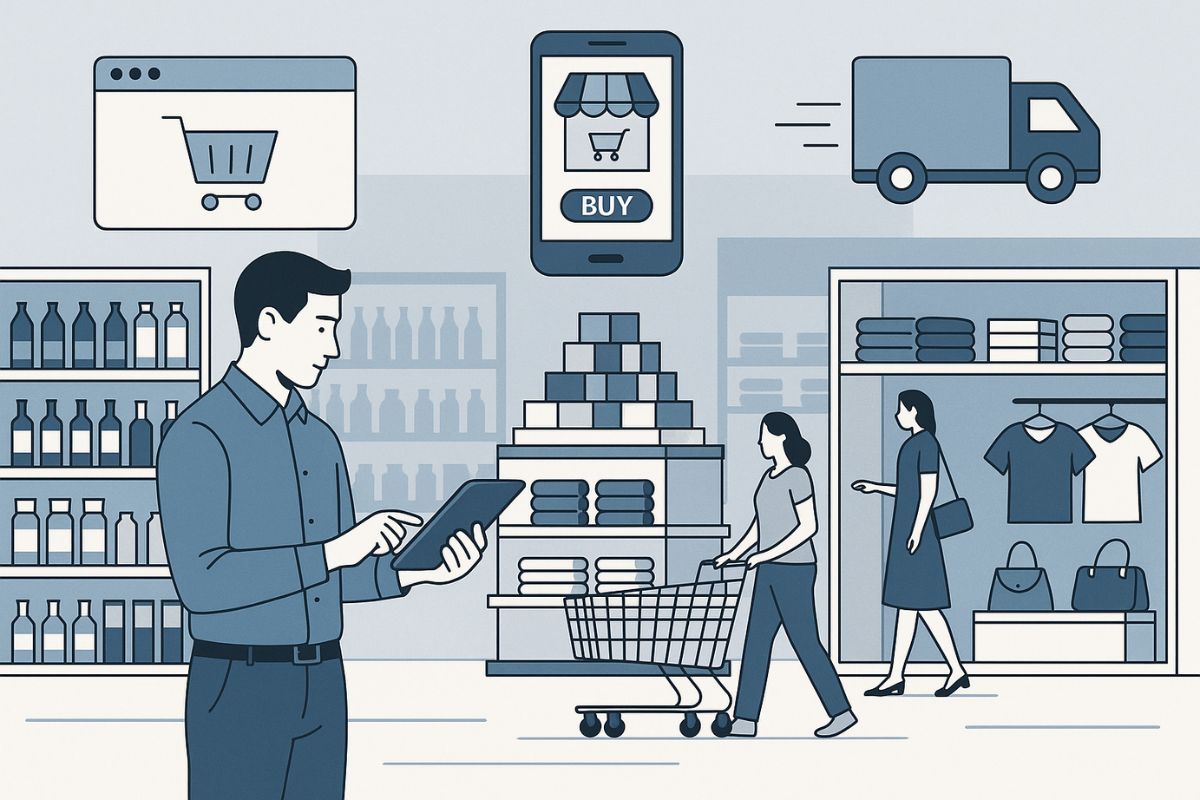Knowledge of retail management has become vital in today’s ever-changing business world. The retail industry connects producers and consumers and plays a significant role in the global economy. Retail management is the process that owners or managers use to run, maintain and grow their businesses. This ranges from simple operations to complex strategic decisions.
Good retail management will give customers a pleasant shopping experience that leaves them satisfied. It uses various strategies and tools to help companies handle operations well, meet customer needs, and boost profits. So, businesses depend on retail management to create a smooth shopping experience while maximising their success in the market.
This piece takes a deep look at retail management. You’ll learn about its exact definition and get into different management approaches. You’ll also understand the core functions that lead to smooth operations and profitability. Whether you’re a retail professional wanting to boost your skills or someone learning about career opportunities in this field, this piece gives you a clear explanation of this significant business discipline.
Understanding Retail Management
Retail management takes a detailed approach to running retail operations. Retail management refers to the process of supervising and controlling day-to-day operations of a retail business to ensure smooth functioning and profitability. The process covers planning, organising, coordinating, and directing activities within retail stores or chains.
We focused on managing various aspects of retail operations such as inventory management, customer service, staff supervision, and coordination with suppliers and logistics partners. Retail managers create exceptional shopping experiences through well-organised stores, trained helpful staff, and consistent product availability.
Retail management is different from general business management because of its specific focus. Business management handles all functional areas of an enterprise, while retail management focuses on the retail function. Small businesses might see these roles overlap, but larger organisations keep retail management as a distinct specialisation.
Retail management has grown beyond traditional store-based approaches. Modern retail managers now handle multiple channels including physical stores, online platforms, and mobile applications. This omnichannel approach needs consistent inventory, pricing, and customer experiences across all platforms.
Successful retail businesses rely on effective retail management. It optimises operations, boosts customer satisfaction, and drives profitability in competitive markets.
Key Features and Types of Retail Management
Technology and changing consumer behaviours have completely reshaped the retail management scene. Successful retail management systems have several key features that set them apart. Corporate retail chains get great benefits from centralised management. This helps them maintain consistent product offerings and customer experiences in stores of all sizes. Plus, these systems use economies of scale that let businesses buy in bulk and keep prices competitive.
Retail management splits into two main types: store-based and non-store based. Store-based retail operates through physical locations where customers can inspect products before making a purchase. Non-store retail has e-commerce, direct selling, telemarketing, and vending machines that offer convenience without actual stores.
The franchising model is another way businesses work under well-known brand names. Unit franchises are single standalone stores. Master franchises control entire territories. Conversion franchises turn existing businesses into franchise outlets.
Modern retail management now welcomes omnichannel strategies that blend physical and digital shopping. Customers can move naturally between online browsing and in-store buying. They see the same prices and promotions no matter how they shop.
Students taking a Retail Management Course need to think over both micro factors and macro environments. This means understanding suppliers and customers while keeping track of economic conditions and industry trends.
Core Functions of Retail Management
Retail businesses succeed by becoming skilled at several core functions of retail management that create profitable operations together. A complete Retail Management Course teaches everything in retail business’s backbone functions.
The most critical function is workforce management that helps retailers line up staff levels with customer needs and adapt when schedules change unexpectedly. Businesses can optimise their labour coverage based on KPIs while managing schedules quickly.
Sales tracking serves as a crucial tool to understand customer priorities and spot trends. Retailers can utilise transaction data and analyse popular products to make smart decisions about pricing and promotions.
The art of visual merchandising focuses on showcasing products to highlight their features and benefits. Retailers can attract customers and drive purchases through strategic displays and product placement.
Inventory management gives retailers the right amount of stock to capture sales while controlling costs. Smart inventory control stops overstocking, reduces stockouts, and cuts down transportation expenses.
Store layout optimisation shapes the way customers shop and buy. A well-laid-out floor plan helps customers locate products and encourages them to make extra purchases.
A solid grasp of these functions prepares retail professionals to excel, which makes specialised programmes like the IIM Retail Management course valuable for growing your career.
Conclusion
Retail management is a complex field that goes way beyond the reach and influence of simple store operations. This piece explores its complete definition, types, and everything in retail management that makes it a vital business specialisation. The retail map continues to change faster, especially when you have omnichannel approaches connecting physical and digital shopping experiences.
Retail professionals need a solid grasp of these fundamentals to succeed in competitive markets. A store’s success depends on several connected elements – workforce management, sales tracking, visual merchandising, inventory management, and layout optimisation. These elements work together to create exceptional customer experiences and maintain profitability.
Success in this field might require formal education. The IIM Retail Management course gives a complete training package that covers vital retail functions and explains emerging trends and technologies. The knowledge gained serves as a practical toolkit for daily operations and creates a strategic framework for long-term business growth.
Professionals who become skilled at these concepts gain an advantage in this transforming industry. Time invested in learning retail management principles brings great returns for career growth and business performance. This expertise becomes valuable as retailers tackle the challenge of meeting customer expectations across multiple shopping channels.
Disclaimer: This content is provided by a third party and does not reflect the views or opinions of Ground Report. No journalist is involved in creating this material, and it does not imply any endorsement by the editorial team. Ground Report Digital LLP takes no responsibility for the content that appears in third-party articles and the consequences thereof, directly, indirectly or in any manner. Viewer discretion is advised.
Follow Ground Report on X, Instagram and Facebook for environmental and underreported stories from the margins. Give us feedback on our email id greport2018@gmail.com.
Don’t forget to Subscribe to our weekly newsletter, Join our community on WhatsApp, Follow ourYoutube Channel for video stories.
Check out Climate Glossary to learn about important environmental terms in simple language.
Keep Reading
Tank under construction, dam under repair & Chanderi Village struggles for water?
Constructed wetlands can provide a solution for wastewater treatment
Indore Reviving Historic Lakes to Combat Water Crisis, Hurdles Remain
Jal Shakti Abhiyan: Catch the Rain 2024 Emphasizes Women in Water Conservation










